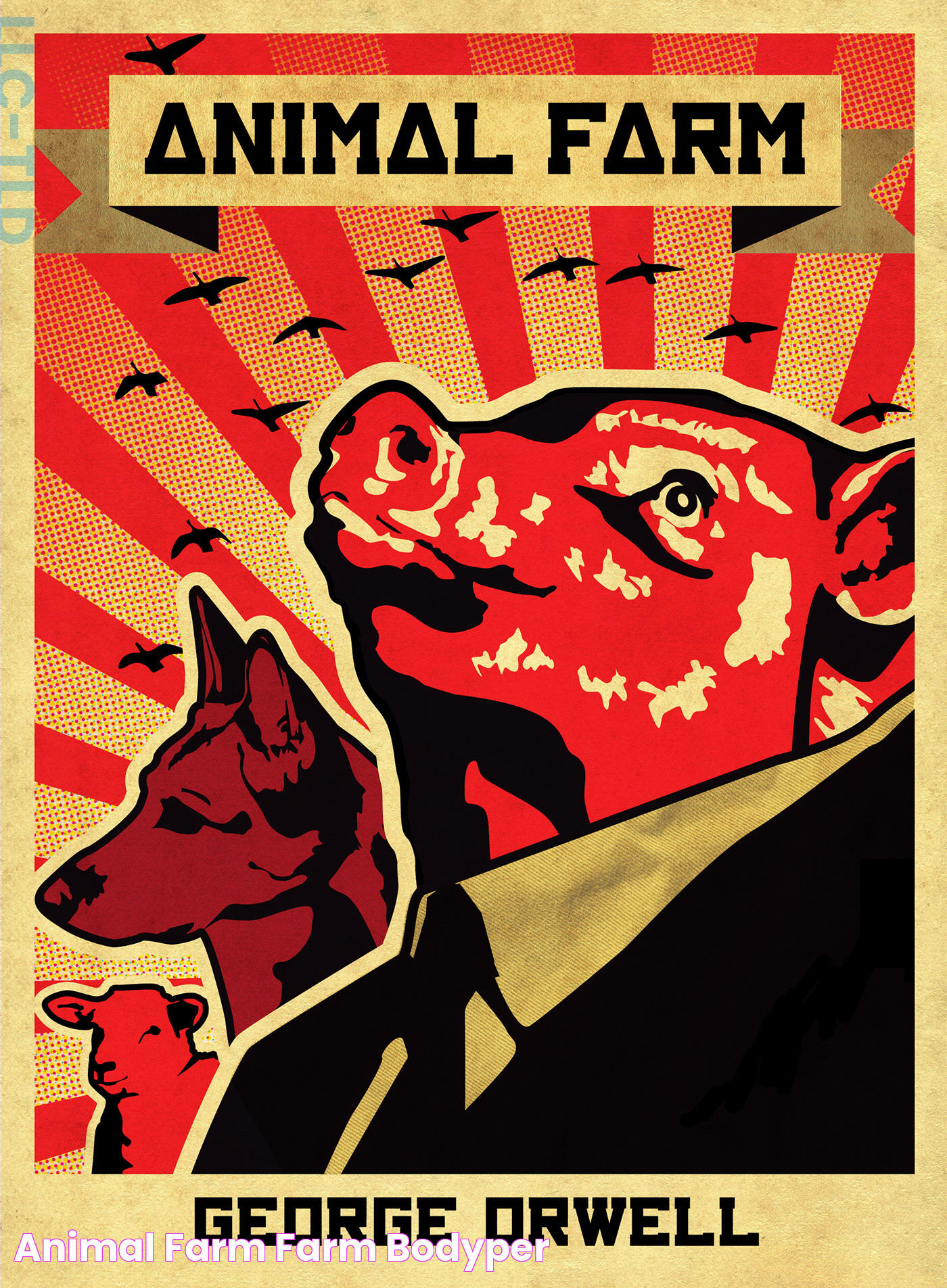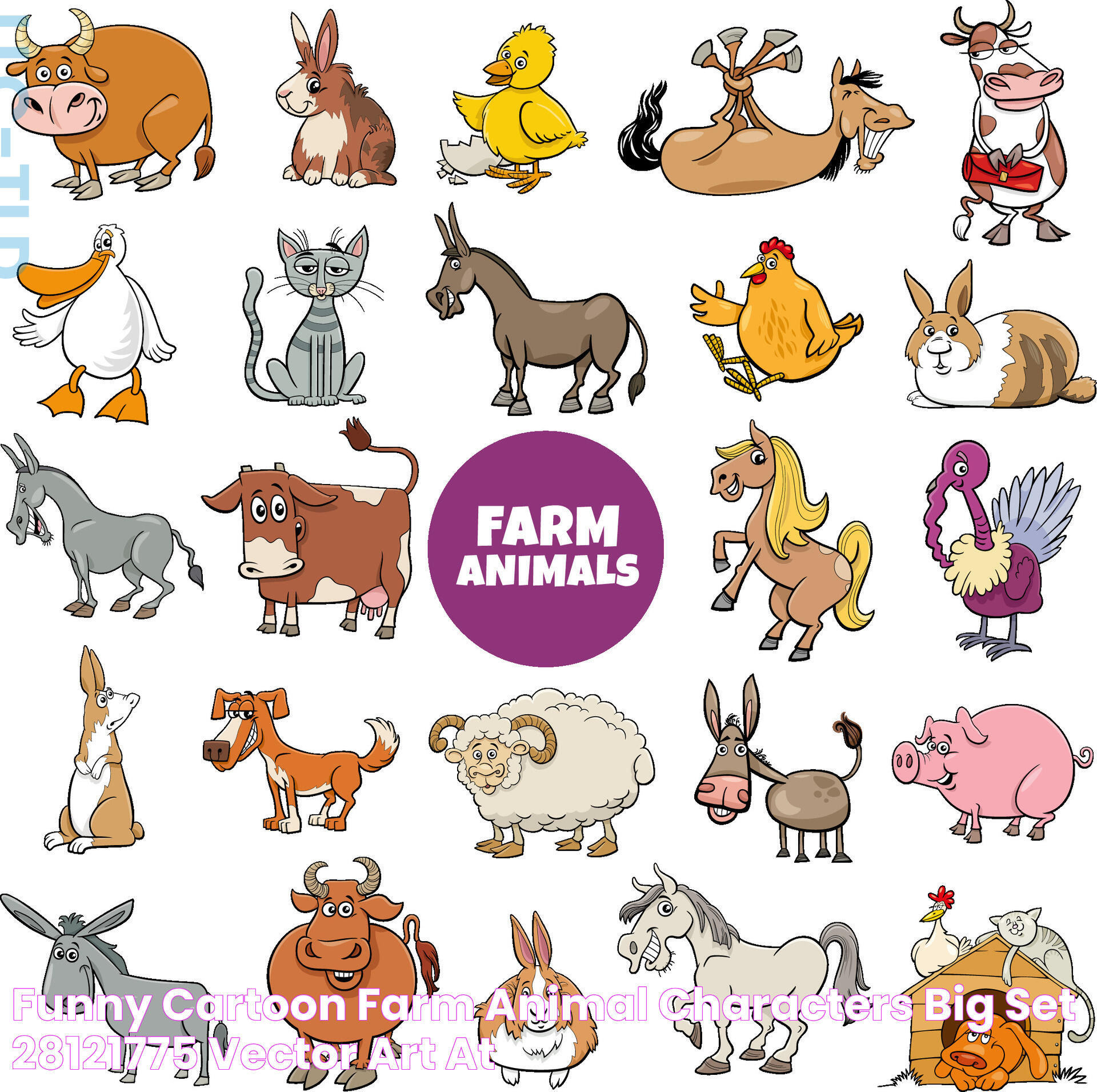George Orwell's "Animal Farm" is more than just a simple tale about animals on a farm. It is a profound allegory that captures the intricacies of political dynamics and human nature through the lens of its unique characters. Each character in the story is meticulously crafted, serving not only as a narrative device but also as a symbol representing various figures and ideologies. Understanding these characters is crucial to grasping the novel's deeper meanings and themes.
The characters in "Animal Farm" are not just animals; they are representations of complex human behaviors and historical figures. Orwell's skillful storytelling imbues each character with a personality that mirrors real-world personalities and political entities. This transformation of animals into symbolic figures allows readers to engage with the narrative on multiple levels, making the book a timeless piece of literature.
In this article, we will delve into the world of "Animal Farm," exploring each character's role, symbolism, and significance. We aim to provide a comprehensive analysis that will enhance your understanding and appreciation of this classic work. Whether you are a student, a teacher, or just someone with a keen interest in literature, this guide will offer valuable insights into the captivating characters of "Animal Farm."
Read also:Direct Vs Indirect Hernia A Comprehensive Guide
Table of Contents
- Napoleon: The Tyrannical Boar
- Who is Snowball?
- Squealer: The Persuasive Pig
- Boxer: The Dedicated Workhorse
- Clover: The Caring Mare
- Why is Benjamin Cynical?
- Mollie: The Vain Mare
- Moses: The Raven of Religion
- Mr. Jones: The Inept Farmer
- Who is Mr. Whymper?
- The Hens: Symbols of Rebellion
- The Sheep: The Blind Followers
- The Dogs: Napoleon's Enforcers
- The Cats: The Self-Serving Opportunists
- Frequently Asked Questions
- Conclusion
Napoleon: The Tyrannical Boar
Napoleon is one of the primary characters in "Animal Farm," symbolizing the rise of totalitarianism. He is a large Berkshire boar who becomes the farm's dictator, representing Joseph Stalin in the allegory. Napoleon is characterized by his cunning and ruthless pursuit of power. Unlike Snowball, his rival, Napoleon is not interested in the betterment of all animals but rather in consolidating his control over the farm.
Napoleon's leadership style is authoritarian, employing propaganda through Squealer and the intimidation tactics of his loyal dogs. His actions illustrate how power can corrupt, as he gradually becomes indistinguishable from the human oppressors he initially overthrew. Through Napoleon, Orwell presents a critique of the corrupting influence of absolute power and the betrayal of revolutionary ideals.
Who is Snowball?
Snowball is another key character and serves as Napoleon's main rival. He is an intelligent and eloquent pig who represents Leon Trotsky. Snowball is innovative and committed to improving the farm's conditions through various projects, such as the windmill. His ideas and leadership style are often democratic, favoring discussions and votes among the animals.
Despite his good intentions, Snowball is ousted from the farm by Napoleon, highlighting the theme of political betrayal and the dangers of holding dissenting views in a totalitarian regime. Snowball's character underscores the conflict between progressive change and the desire for power, as well as the manipulation of history and information.
Squealer: The Persuasive Pig
Squealer is the farm's propagandist, a pig who possesses outstanding oratory skills. He represents the Soviet press, particularly the Pravda, which was used to manipulate the masses. Squealer's role is to justify Napoleon's actions and policies to the other animals, twisting the truth to maintain the regime's image.
Through Squealer, Orwell explores the power of language and propaganda in shaping public perception and controlling society. His ability to "turn black into white" demonstrates how those in power can distort reality to serve their interests, a theme that remains relevant in today's media landscape.
Read also:Experience The Thrill Drive From Miami To Key West
Boxer: The Dedicated Workhorse
Boxer is a strong and hardworking cart-horse, emblematic of the proletariat or working-class individuals. His mottos, "I will work harder" and "Napoleon is always right," reflect his unwavering loyalty and dedication to the cause. Boxer is respected by all animals for his strength and work ethic.
However, his blind trust in the leadership leads to his downfall, as he is ultimately betrayed by Napoleon. Boxer's tragic fate serves as a powerful commentary on the exploitation of the working class and the consequences of unquestioning loyalty to corrupt leaders. His character evokes sympathy and highlights the need for critical thinking and awareness.
Clover: The Caring Mare
Clover is a gentle and maternal mare who represents the female working class. She is Boxer's close friend and often senses that something is amiss with the leadership of the farm. Despite her suspicions, she struggles to articulate her thoughts and express doubts.
Clover's character embodies the theme of disillusionment and the internal conflict faced by those who sense injustice but lack the means or confidence to challenge it. Her nurturing nature contrasts with the harsh realities of the farm, adding depth to the narrative and highlighting the emotional toll of living under oppressive regimes.
Why is Benjamin Cynical?
Benjamin is the oldest animal on the farm, a donkey known for his cynical and skeptical outlook. He represents the intellectuals who are aware of the injustices but choose not to act. Benjamin maintains that "life will go on as it always has – badly," reflecting his belief that change is futile.
Despite his pessimism, Benjamin cares deeply for Boxer and is profoundly affected by his friend's fate. His character raises questions about the responsibility of those who recognize oppression yet remain passive. Benjamin's cynicism serves as a warning against apathy and the importance of taking action against tyranny.
Mollie: The Vain Mare
Mollie is a vain and self-centered mare who enjoys the finer things in life, such as ribbons and sugar cubes. She represents the bourgeoisie or those who are reluctant to give up their comforts for the sake of the collective good. Mollie's desire for luxury ultimately leads her to abandon the farm.
Her character illustrates the challenges of achieving unity in a revolutionary movement, as not all individuals are willing to sacrifice personal interests. Mollie's departure highlights the theme of self-interest and the difficulty of maintaining solidarity in the face of diverse motivations and priorities.
Moses: The Raven of Religion
Moses is a tame raven who tells tales of "Sugarcandy Mountain," a paradise where animals go when they die. He represents organized religion, specifically the Russian Orthodox Church, which was used to placate the oppressed with promises of a better afterlife.
Moses' character raises questions about the role of religion in society and its use as a tool for control. His presence on the farm serves as a reminder of the power of ideology in maintaining the status quo and the potential for belief systems to both inspire and deceive.
Mr. Jones: The Inept Farmer
Mr. Jones is the original owner of the farm, representing the overthrown monarchy or the bourgeoisie. His neglect and mistreatment of the animals spark the rebellion, setting the stage for the rise of the pigs. Mr. Jones is depicted as a careless and irresponsible leader whose incompetence leads to his downfall.
Through Mr. Jones, Orwell critiques the failures of the old regime and the conditions that lead to revolutionary change. His character serves as a reminder of the importance of effective leadership and the consequences of ignoring the needs and rights of those being governed.
Who is Mr. Whymper?
Mr. Whymper is a solicitor hired by Napoleon to represent Animal Farm in human society. He symbolizes the Western nations and capitalists who engage with oppressive regimes for their gain. Mr. Whymper's interactions with the farm reflect the complexities of international relations and the moral compromises often involved.
His character illustrates the theme of complicity and the extent to which external parties may enable or benefit from corrupt systems. Mr. Whymper's role in the story highlights the interconnectedness of global politics and the ethical dilemmas faced by those who prioritize profit over principles.
The Hens: Symbols of Rebellion
The hens in "Animal Farm" represent the peasant class and their resistance against exploitation. When Napoleon demands that their eggs be sold, the hens rebel by smashing their eggs, symbolizing their refusal to comply with oppressive demands.
Their rebellion, though ultimately crushed, underscores the theme of resistance and the struggle for autonomy. The hens' actions serve as a testament to the power of collective action and the resilience of those who fight for their rights, even in the face of overwhelming odds.
The Sheep: The Blind Followers
The sheep are emblematic of the masses who blindly follow authority without questioning. They are easily manipulated by Squealer and are often used to drown out dissent with their repetitive bleating of slogans like "Four legs good, two legs bad."
Through the sheep, Orwell critiques the dangers of conformity and the ease with which propaganda can sway public opinion. Their role in the story highlights the importance of critical thinking and the need for individuals to question and challenge the status quo.
The Dogs: Napoleon's Enforcers
The dogs are Napoleon's loyal enforcers, representing the secret police or military forces used to maintain control. Trained from a young age by Napoleon, they serve as his personal bodyguards and are instrumental in his consolidation of power.
Their presence on the farm underscores the theme of intimidation and the use of force to suppress dissent. The dogs' loyalty to Napoleon and their willingness to carry out his orders illustrate the corrupting influence of power and the lengths to which leaders will go to protect their authority.
The Cats: The Self-Serving Opportunists
The cats in "Animal Farm" are depicted as self-serving and opportunistic, representing those who seek to benefit from any situation without regard for principles or loyalty. They rarely participate in the farm's activities and are primarily concerned with their interests.
Their character highlights the theme of opportunism and the challenges of achieving collective action when individuals prioritize personal gain over the common good. The cats serve as a reminder of the diverse motivations present within any movement and the obstacles to unity.
Frequently Asked Questions
- What does Napoleon represent in "Animal Farm"?
Napoleon represents Joseph Stalin and the rise of totalitarianism, highlighting the corrupting influence of power. - How does Snowball's character differ from Napoleon's?
Snowball is more democratic and progressive, focusing on improvements, whereas Napoleon is authoritarian and power-hungry. - What role does Squealer play on the farm?
Squealer acts as the farm's propagandist, using language to manipulate and control the perceptions of the other animals. - Why is Boxer considered a tragic character?
Boxer's blind loyalty and trust lead to his exploitation and betrayal, symbolizing the plight of the working class. - What is the significance of Moses and "Sugarcandy Mountain"?
Moses represents religion, used to placate the oppressed with promises of a better afterlife, maintaining the status quo. - How do the sheep contribute to the farm's dynamics?
The sheep represent blind followers, easily manipulated to propagate slogans and drown out dissent, showcasing the power of propaganda.
Conclusion
In "Animal Farm," George Orwell crafts a compelling narrative through his diverse cast of characters, each symbolizing different facets of society and political ideologies. From the power-hungry Napoleon to the hardworking Boxer, the characters serve as vehicles for exploring themes of power, corruption, and resistance. Understanding these characters and their roles enhances our appreciation of Orwell's timeless allegory and offers valuable insights into the complexities of human nature and governance.
For further reading on the themes and symbolism in "Animal Farm," consider exploring scholarly articles or analyses that delve deeper into Orwell's intentions and the historical context of the novel.

